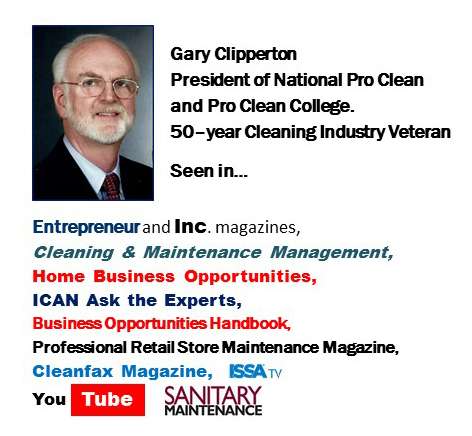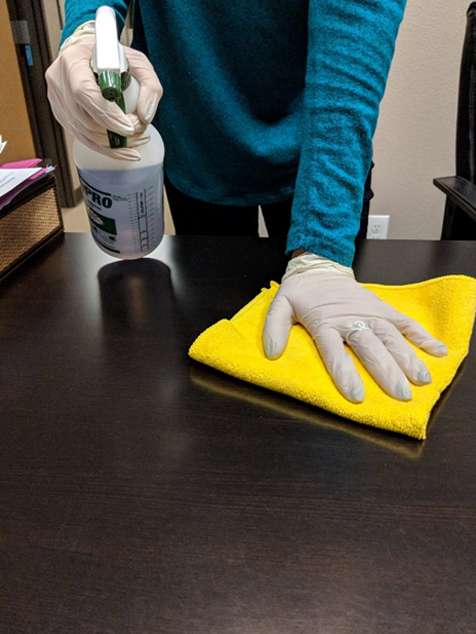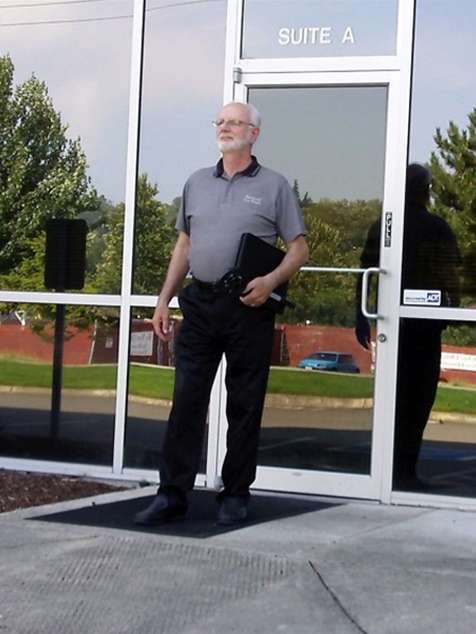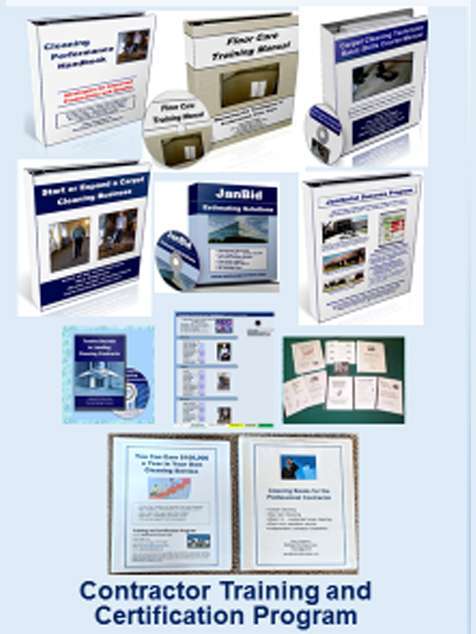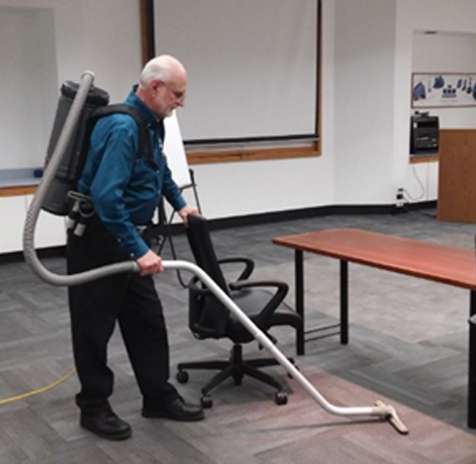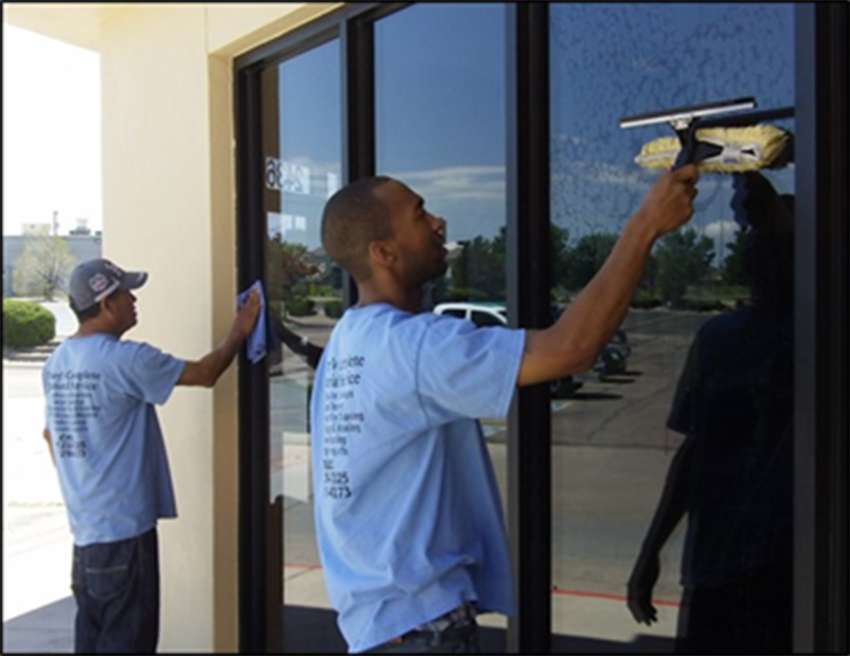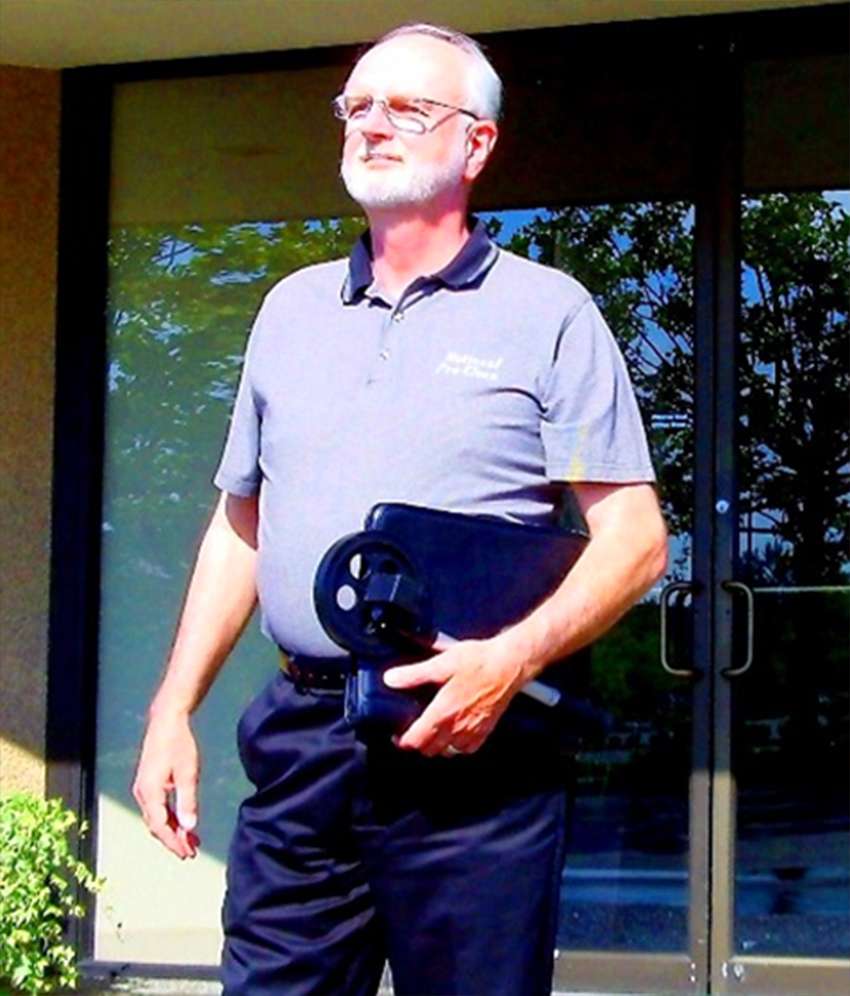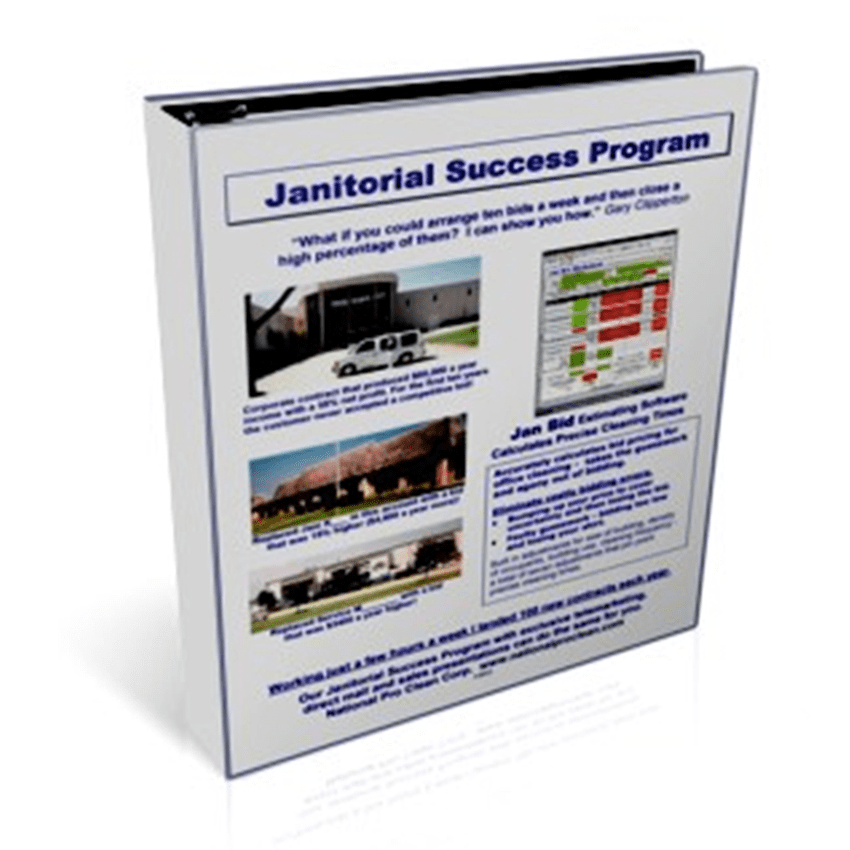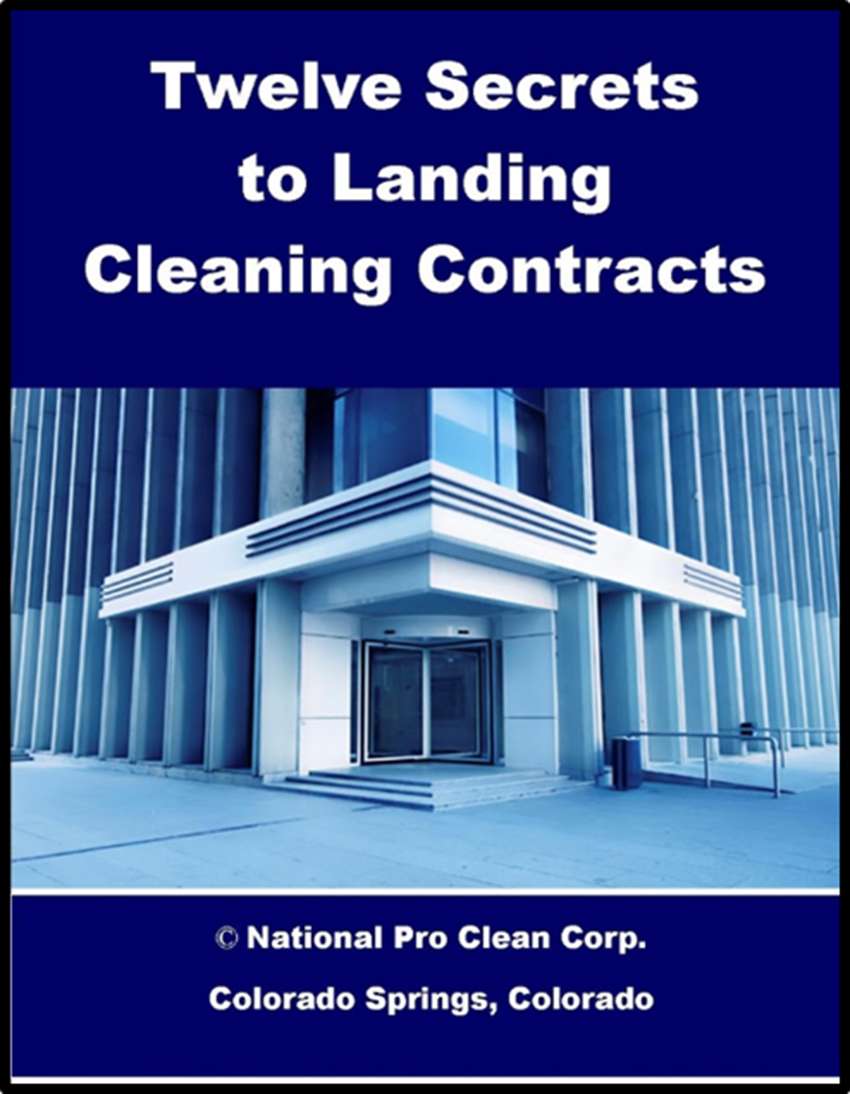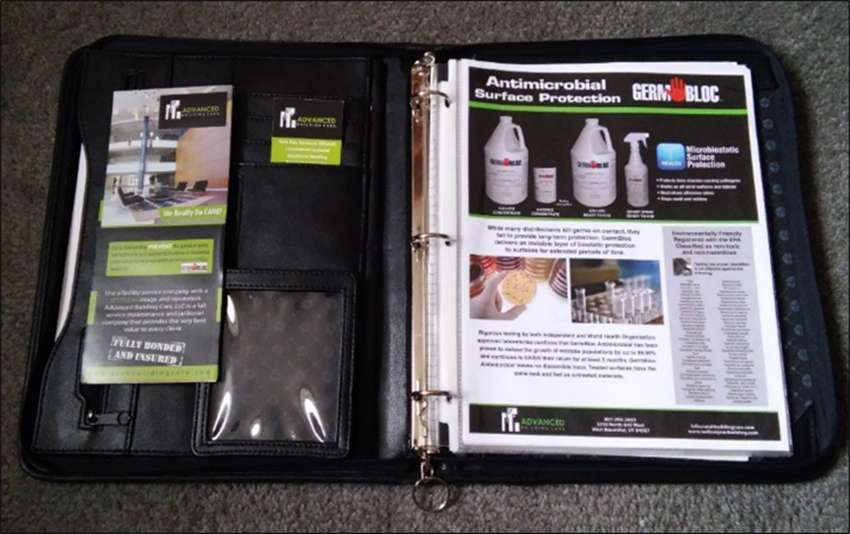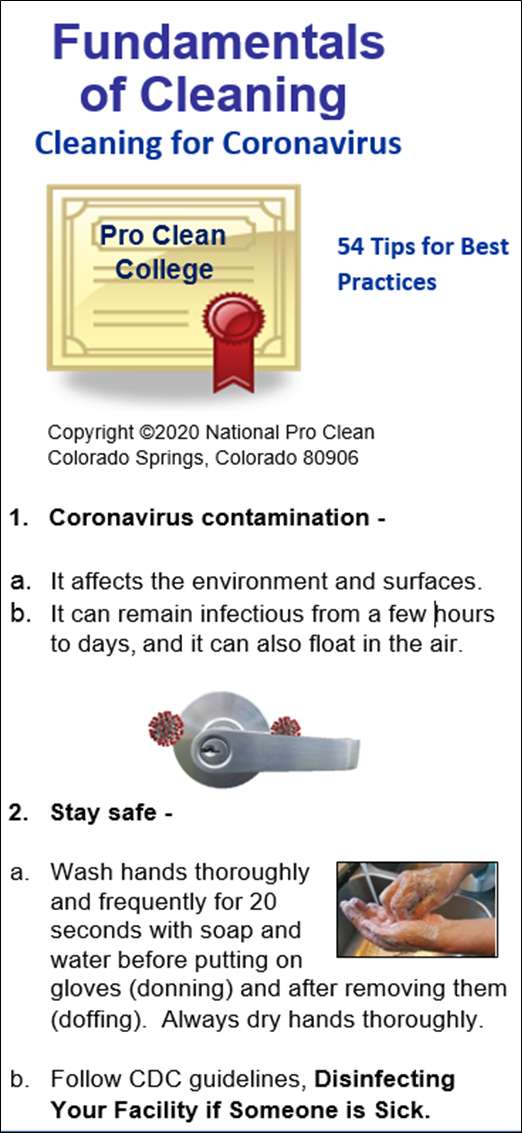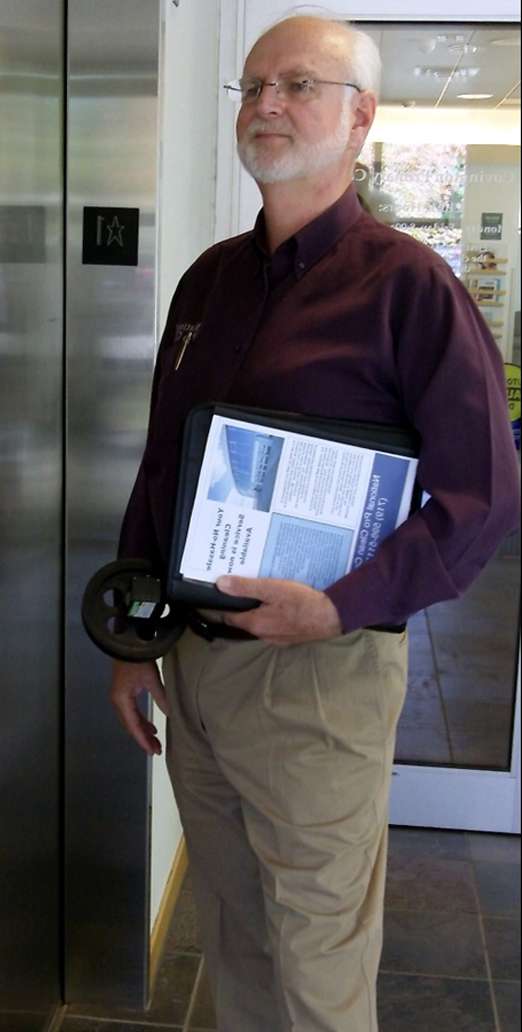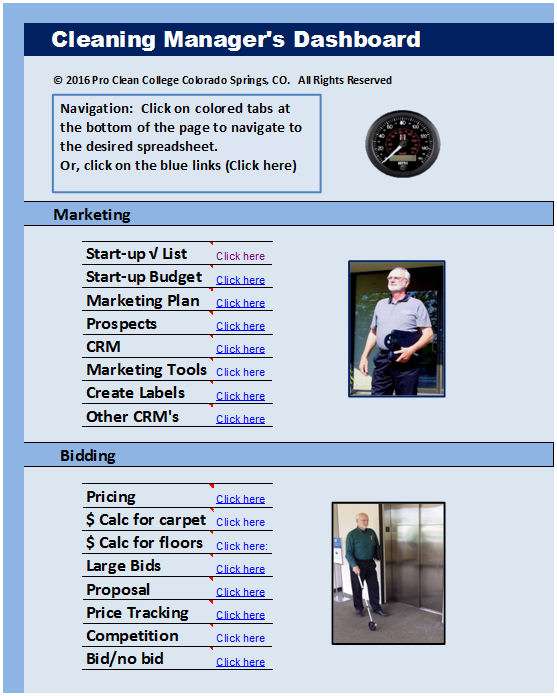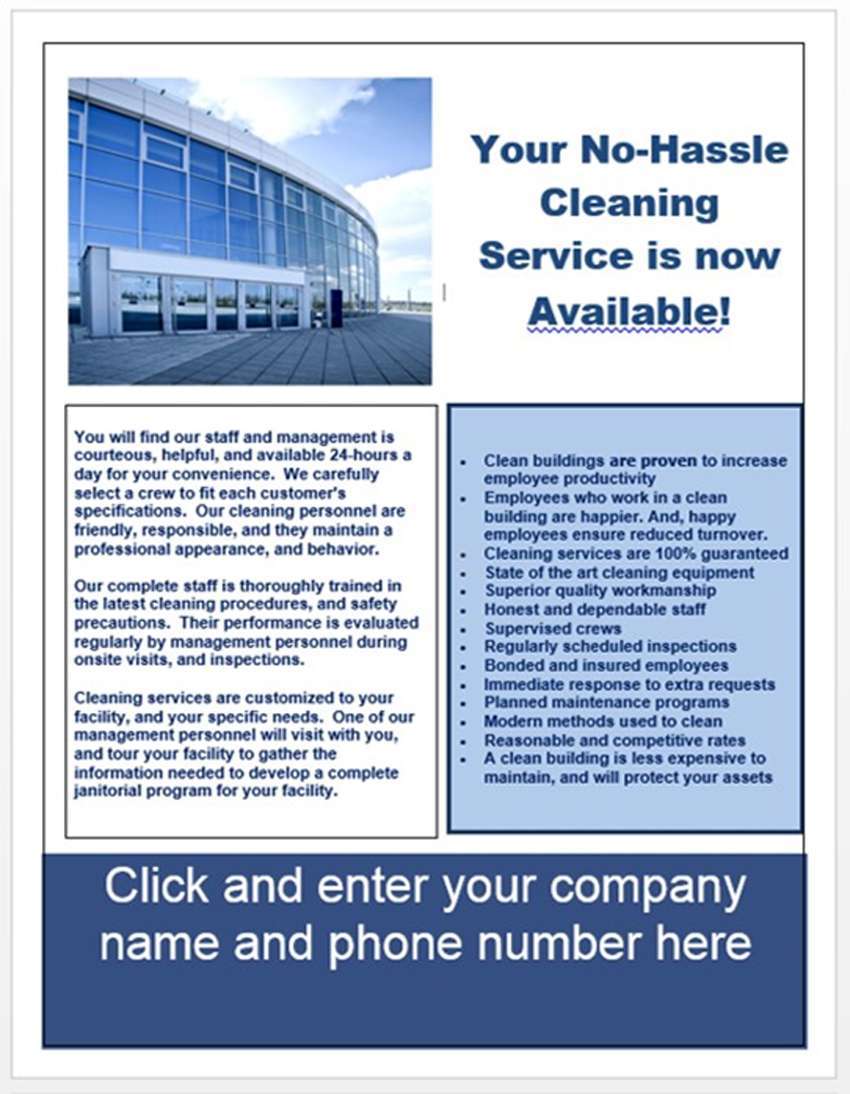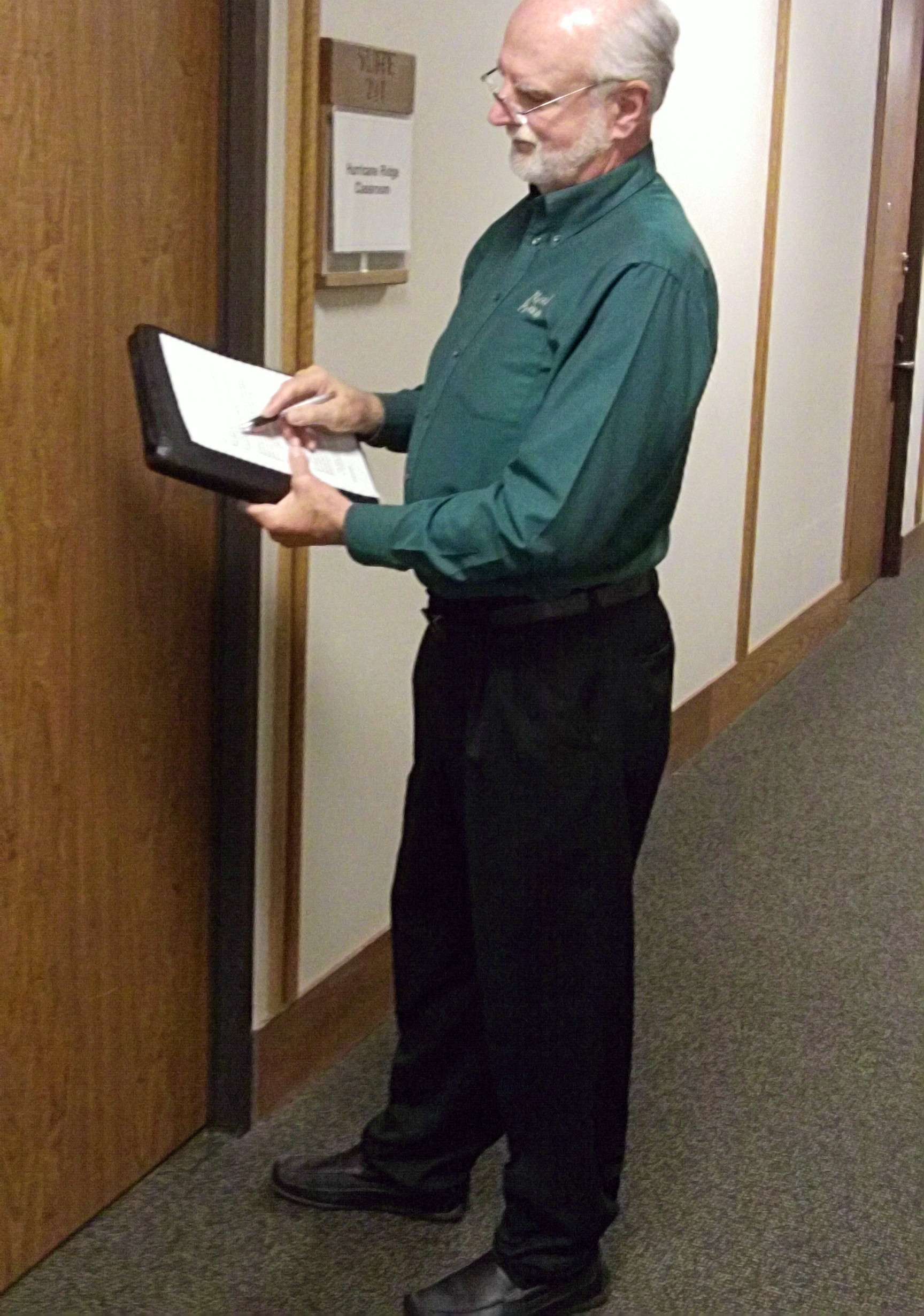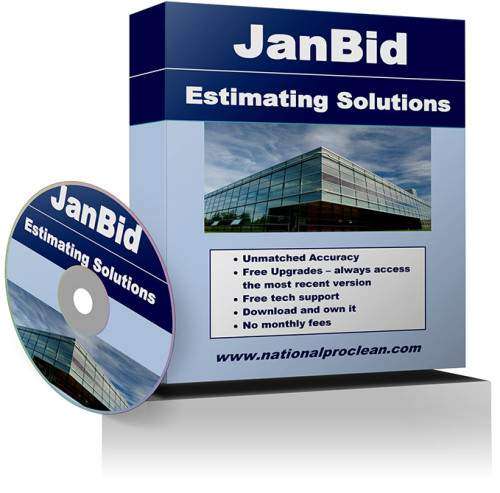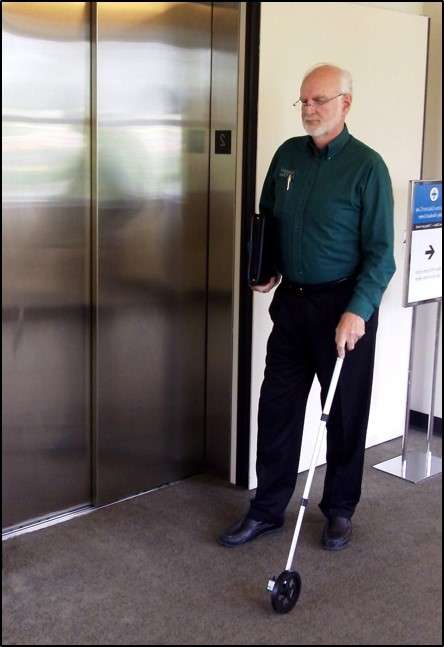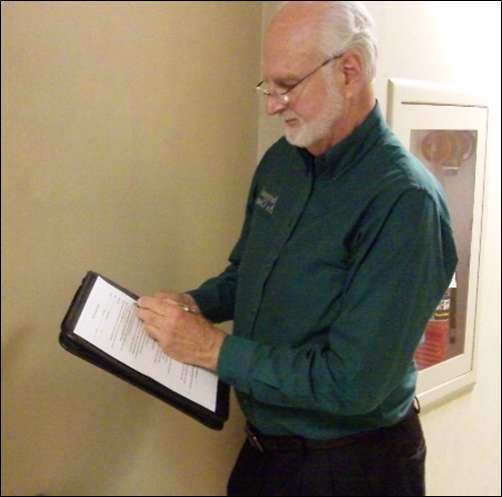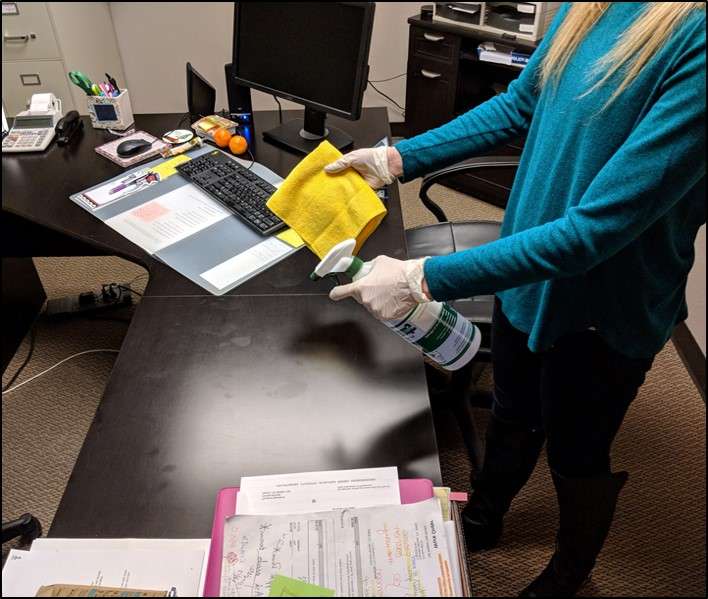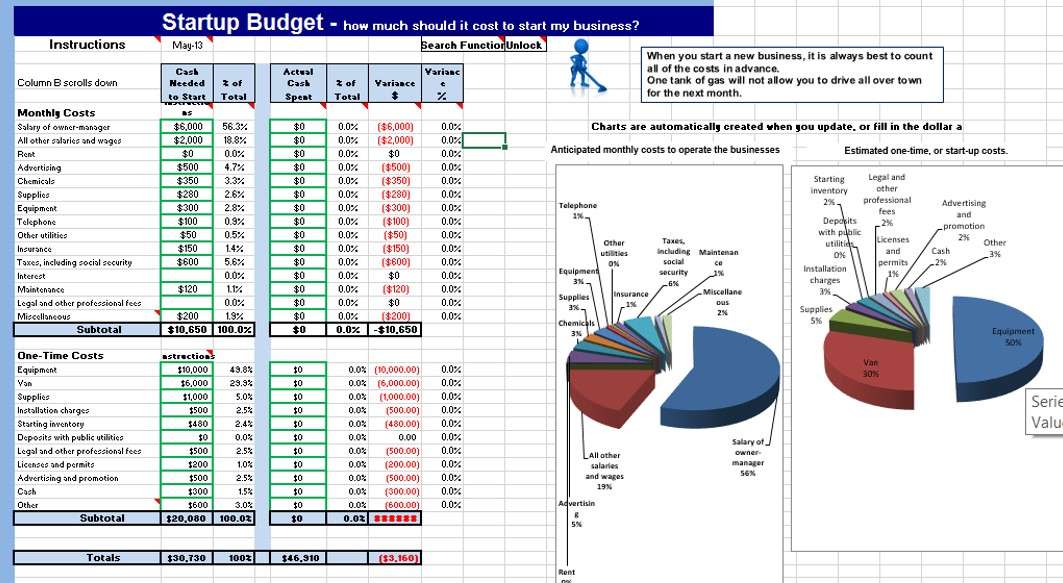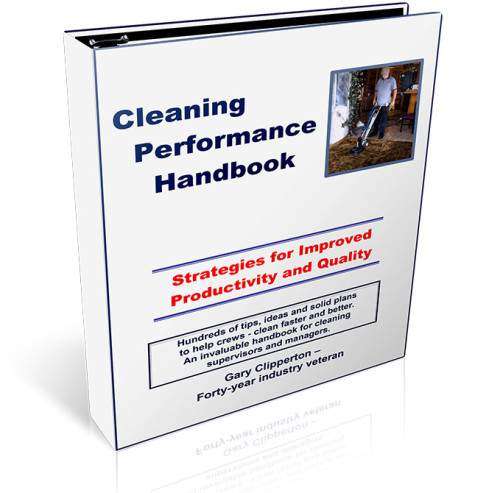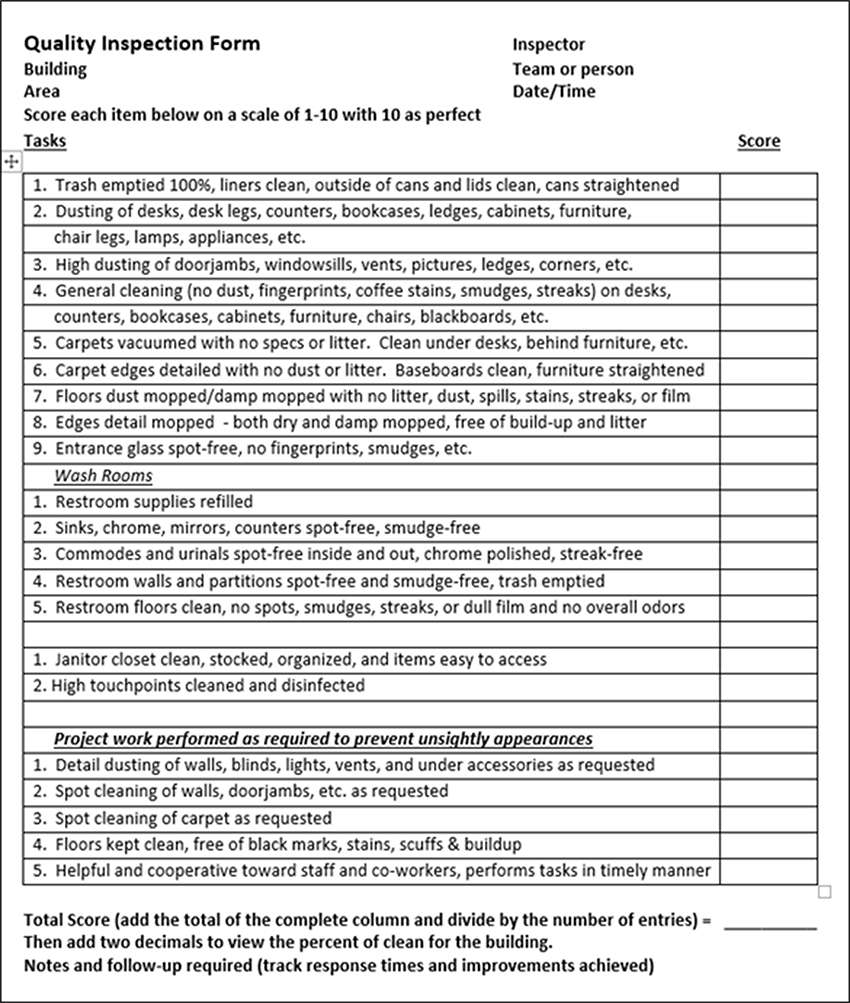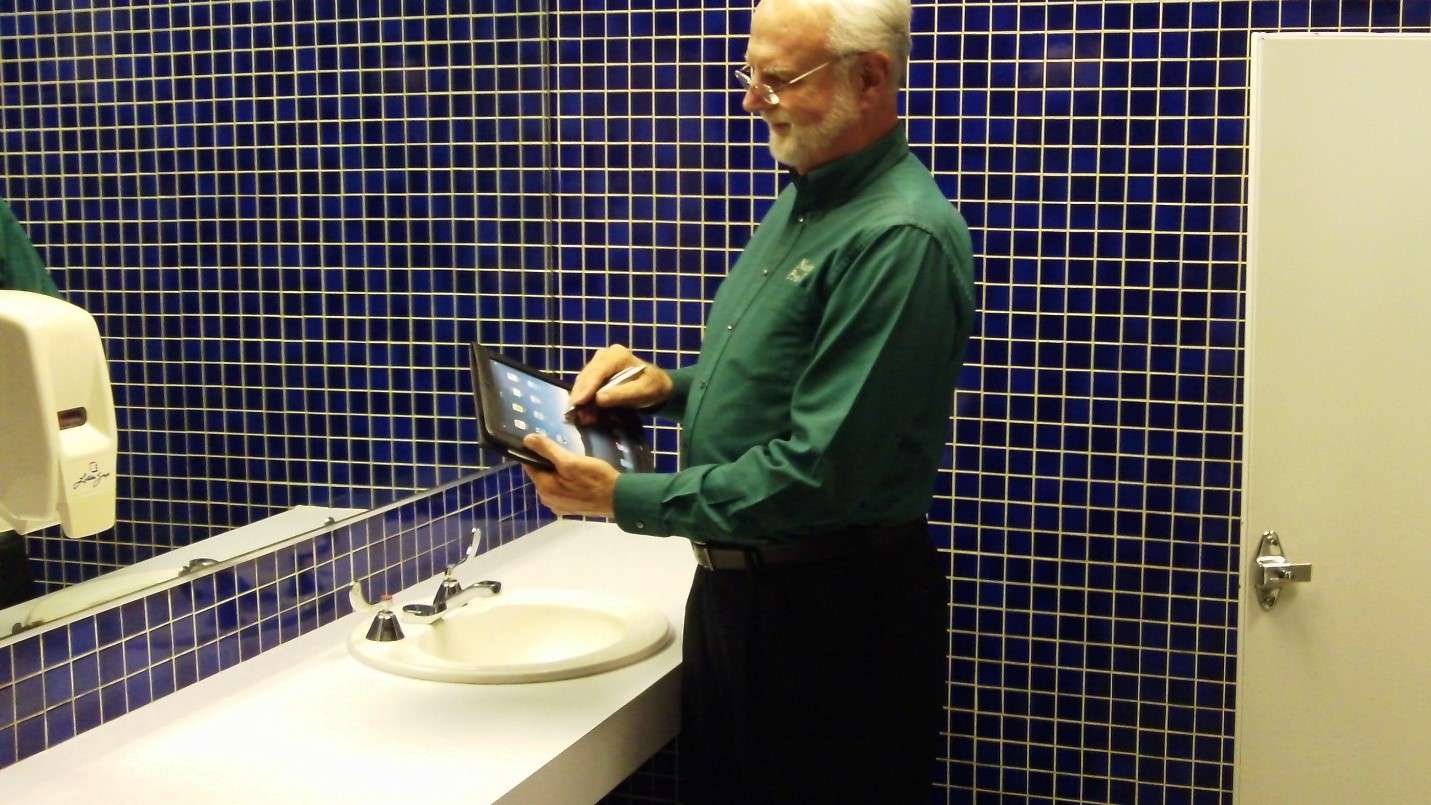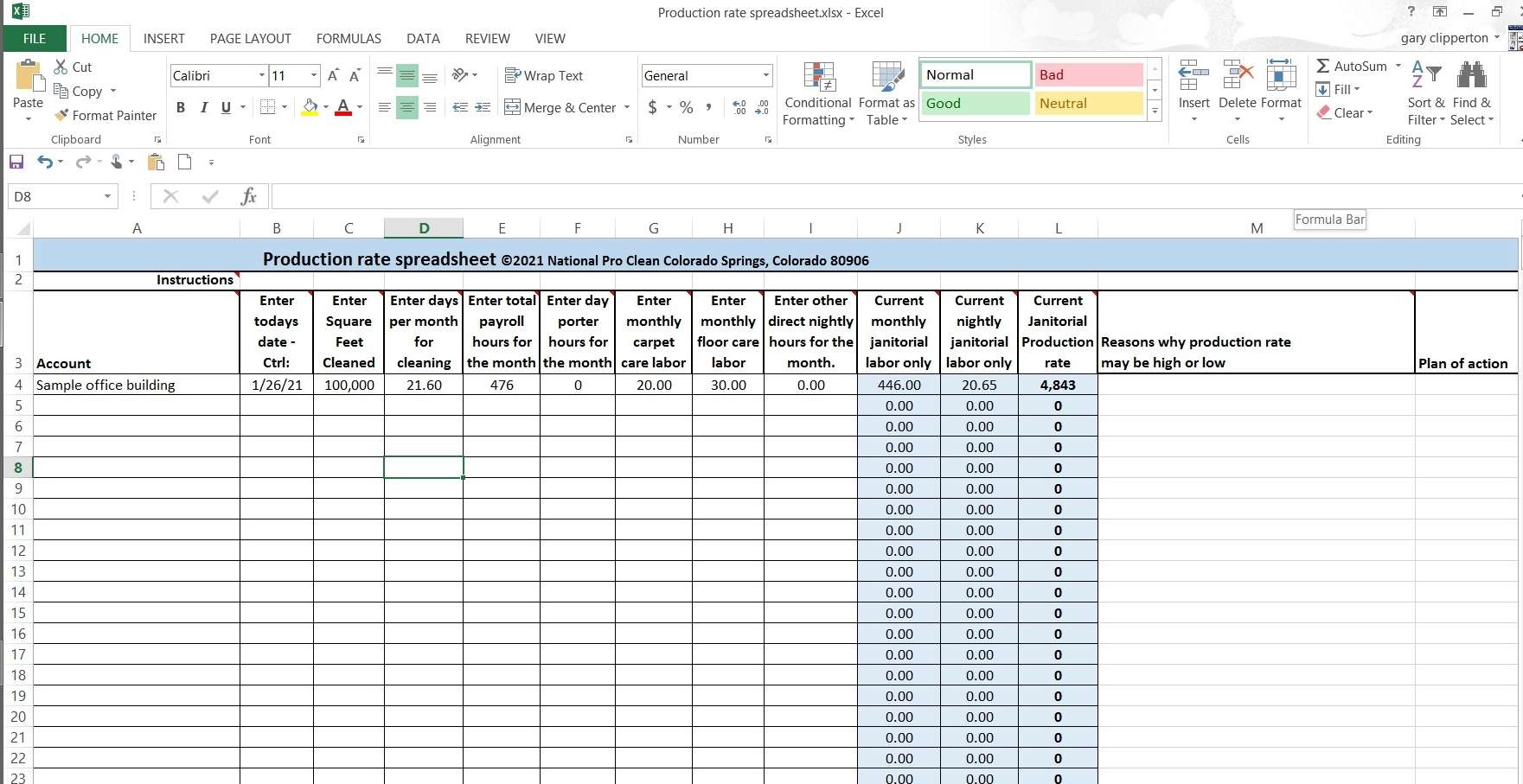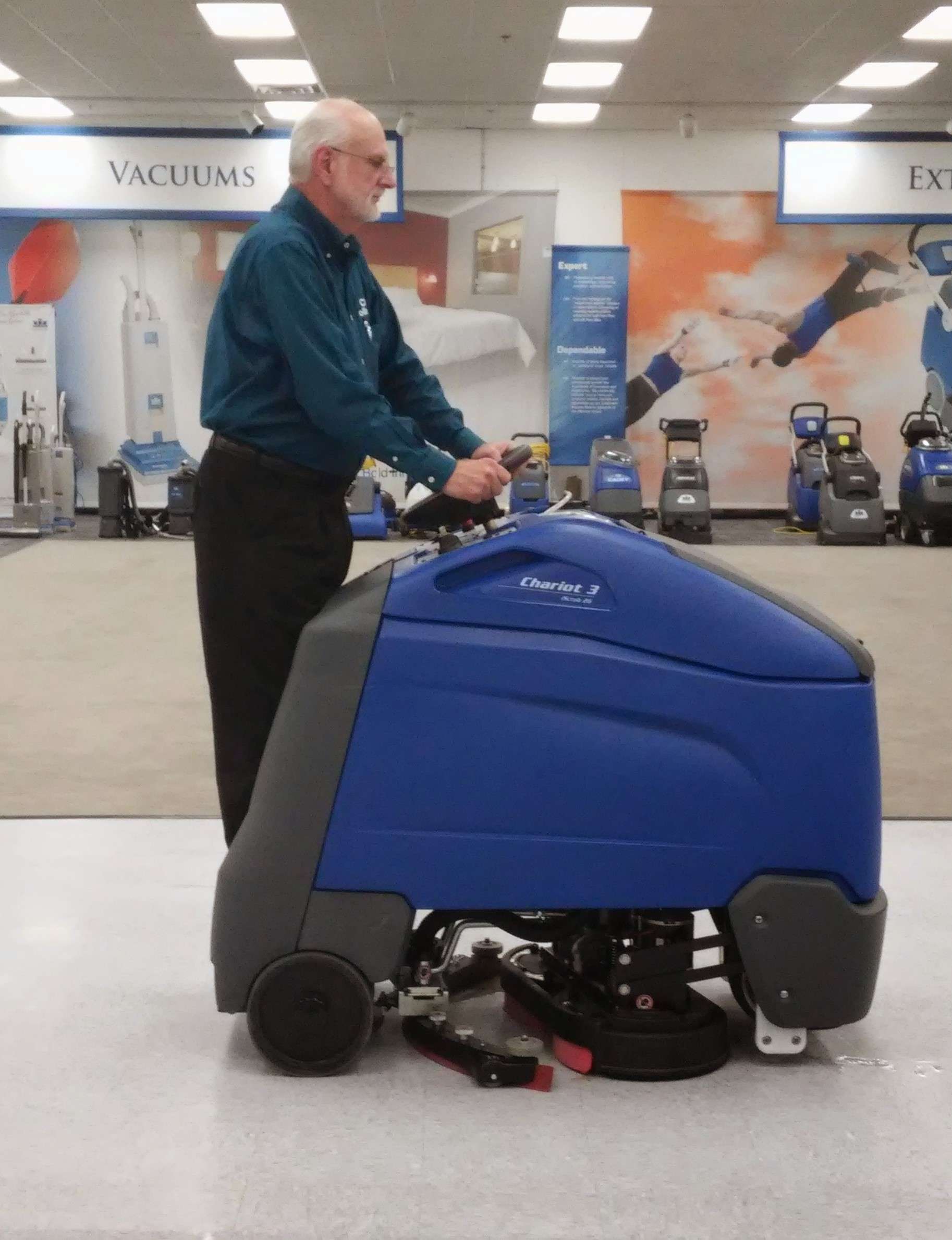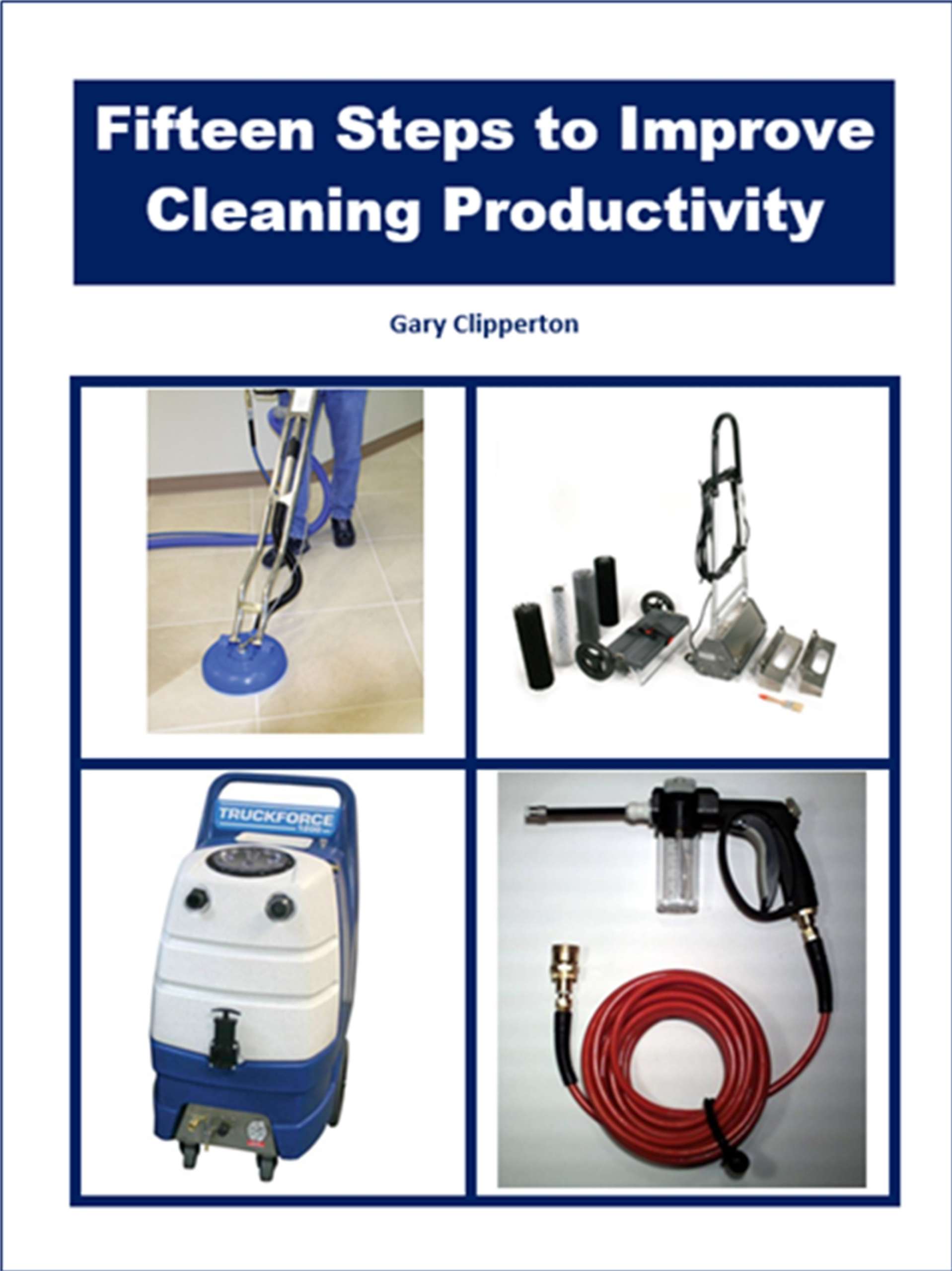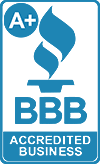© 2021 National Pro Clean Corp. Check out our Partners Page Here!
Choose an expert to help you grow your business
An office cleaning business, janitorial, carpet cleaning, or floor care service can be extremely profitable. It can be started part-time as a home-based business and built at your own pace. There are several critical steps you will need to master. Our free advice can help you overcome common start-up and expansion obstacles.
by Gary Clipperton a 50-year cleaning industry veteran and President of National Pro Clean and Pro Clean College.
Best cleaning contractor program on the market
Marketing
Starting a cleaning business requires taking positive action to locate prospects and close contracts. Learning to land your own accounts is a critical step to ensuring success. An experienced consultant or mentor can help you develop a winning marketing program. Trial and error can be very expensive.
Building owners hire janitorial services to experience the benefits of a professional cleaning crew. Owners and managers are interested in the appearance of their building, the safety and health of the occupants, and the affordability of the cleaning service. They also want to avoid legal repercussions from inadequate maintenance.
Before you begin marketing, develop a list of target accounts, normally within a 20-mile radius of your home or office. Besides saving on gas, there is another benefit of focusing on customers in your neighborhood. When you talk to a prospect you can assure them you live nearby and can readily assist whenever they might need you.
It helps to prospect accounts where you have prior experience or inside contacts. For example, if you have previously worked for a daycare, a church, a doctor, a realtor, a factory, a car dealership, or an attorney, you probably know how the business operates. With this experience, you can approach similar businesses and relate to their needs. Another prospecting source is friends and relatives who work at a business and know that the business is not happy with its present service.
Learn from a marketing pro
Land your fair share of cleaning contracts
Determine the scope of your services before developing any brochures. Decide if you can offer window washing, carpet cleaning, or floor finishing services. Professionally designed literature should showcase your services. Our Janitorial Success Marketing Program contains 50 marketing templates.
It has all the proven sales scripts, how to approach prospects and land the opportunity to provide a free cleaning proposal.
If you are starting part-time, you should decide which marketing approaches best fit your capabilities. Normally, over 60% of the buildings in most cities are cleaned by a janitorial service. By qualifying as the prospects back up (#2), it may not be long before you can become #1.
1-hour Marketing Video
In our DVD video “Secrets of Landing Cleaning Contracts” twelve strategies explain how to develop a dynamic marketing system, approach prospects, handle the sales process, and negotiate contracts.
An account acquisition program can help you establish your marketing strategies. It reminds you where to go and who to see, and keeps you on track. Proper training to upgrade your sales skills is important along with using procedures and forms to track the process. National Pro Clean marketing materials include a list of 25 tips on presenting your bid proposal.
Another helpful marketing strategy is to develop an elevator speech. This is a short (20-30 second) introduction. This brief introduction is prepared in advance to solicit a favorable reaction when meeting new people. To merely say, “Hi, my name is Gary and I own a cleaning service”, is not particularly earth-shaking.
Instead, you could pre-plan an interest-provoking opener such as, “Hi, how are you today?” Then, ask permission to give them a business card and state, “My name is Gary with National Pro Clean. We provide professional and high-quality cleaning services for office buildings and we offer free price quotes. Do you know of anyone who might be interested?” The second introductory speech has a greater chance of creating a favorable response.
Land more cleaning contracts
A sales presentation manual should be developed that includes as many relevant sales points as possible. The objective is to show that you have value-added services that make your cleaning service superior to other companies. Our marketing program contains a 21-page instruction manual showing how to assemble a knock-your-socks-off visual presentation. It also shows 19 reasons why cleaning contractors get canceled.
During preliminary discussions with building owners or managers, keep in mind that they have questions about your capabilities. For example, they may ask if you offer Green Cleaning (http://www.epa.gov/oaintrnt/practices/janitorial.htm) – an environmentally friendly approach. To learn about and offer Green Seal (www.greenseal.org) products and procedures will require additional study and preparation. NSF Sustainability now has a new program to certify cleaning chemicals http://www.nsf.org.
Another area of concern is if you have a procedures manual and proper training to reduce cross-contamination, especially during a pandemic. With proper training, you can offer healthy building cleaning programs that reduce cross-contamination. The spread of diseases including Coronavirus, H1N1, and MRSA contamination has become a major concern for employers. Recent studies show that employees claim that 30% of their illnesses occur at work.
There are several effective marketing approaches including:
- Canvass your territory and leave a brochure and business card. This approach works quite well if you have a proven presentation.
- Approach all the people you know (especially other company owners you do business with) and ask them for referrals. Tell your neighbor that you will buy them dinner if they help you land a contract at the business where they work.
Phone prospects from a target account list available from many local libraries or Reference USA. Use a script that offers a free estimate. - Consider learning the skills to hire and train your own telemarketer or contact a company that specializes in setting bid appointments. Our marketing manual includes three booklets on how to successfully set up your own telemarketers.
- Join a leads exchange club such as (www.bni.com). There are several to pick from in most cities. It requires an investment of time and money. Networking with other business owners can be an effective way to locate customers. Sign up for a free account at alliginable.com and network with local businesses. Your local Chamber of Commerce likely offers networking opportunities.
- Visit general contractors, commercial realtors, owners of the various building trades, and janitorial supply firms. Make sure they have plenty of your business cards. Post your card on bulletin boards.
- Use a postcard mail-out to reach your target account list. Make sure it is professionally designed as a direct response mailer. Offering a discount and free estimate for your cleaning services can attract new accounts.
- Implement a consistent follow-up program for all persons previously contacted. Use postcards, phone calls, and emails. When the “itch cycle” hits, and they are ready to make a change, they will know how to contact you.
- Consider the advertising power of calendars, note pads, pens, and other inexpensive items from advertising specialty companies. You can find a list of the advertising specialty and promotional products suppliers on the Internet.
- Ask for referrals from present customers. Once you secure a new customer, work extra hard to impress them and then ask for a letter of recommendation and referrals. The power of “Word of Mouth” advertising can never be overlooked.
- Consider a small, yet professional website. It may not generate a tremendous number of leads, but it lends credibility to your service. Consider an email advertisement to a qualified lead list or sign up and use LinkedIn and Alignable.
- Study the subject of pandemic cleaning and disinfecting. Many of your prospects want to see your training materials. We have them already prepared for you and your crew.
Free Coronavirus training with any purchase
Land More Cleaning Contracts
One final way to assess marketing responses is to track all of your closing averages. This could include the number of phone calls that must be made to set a bid appointment, the number of mailers to generate a lead, the number of appointments that must be made to locate a qualified prospect, and the number of bids submitted to secure a contract.
Keep in mind that if customers are not rejecting your price about 20% of the time, this could indicate your prices are too low. Our Cleaning Manager’s Dashboard tracks all of your marketing efforts, plus more.
Click Here to view the great features for the 40-spreadsheets that help you run your entire business.
There is a lot to learn about bidding psychology. Contractors, who consistently bid too low, may do so just to get new contracts. They, in turn, may sell off these unprofitable contracts to unsuspecting new startup companies. It doesn’t hurt to remind a prospect that they usually get what they pay for. There can be a high turnover in contractors who over-promise but can’t deliver the required service consistently.
Cleaning Managers Dashboard
Prepare a Professional Bid Proposal Package
Develop or purchase an impressive and professional-looking bid proposal package. It should include attractive fliers describing your service, a thorough cleaning specifications chart, a user-friendly service contract, and details about your service. Remember: failure to discuss itemized and detailed cleaning tasks in advance can lead to problems later on. Our marketing manual contains 50-flyers that can be edited any way you like.
Most prospects want reassurance that you employ trained and qualified workers. They may ask if you have a comprehensive training program and an operations manual. They may even ask to see a written copy of your cleaning procedures, your safety program, your procedures for pre-employment screening, background, and drug checks, procedures for ensuring building security, and your quality assurance program.
Before starting a cleaning business, make sure you have documentation for your internal operational systems.
Our Contractor Training and Certification Program contains over 50 forms and 40 spreadsheets to run your business.
Click here for the ultimate Cleaning Contractor Marketing Program
Professional cleaning proposal
Bidding
A cleaning proposal would include an annual, renewable contract quoting a monthly fee. It is a serious mistake to offer a bid that is priced below your own cost. Do yourself a favor and master the bidding process before you begin submitting proposals. Whenever you price your service too high, your proposal may be tossed out. If your price too low, you may secure the contract and wish that you hadn’t.
Customers don’t feel obligated to help you construct and price your service fees. They figure if you are a qualified contractor, you will know how to submit an accurate price estimate for all the required services. A bidding formula takes into consideration all of your expenses, the desired net profit, and what the market will bear.
Start by estimating how many hours a night it will take to clean the building you are bidding on. Next, determine what the going labor rate is for your city. Then, add your labor burden that that includes all payroll costs. Next, add all of your anticipated expenses including chemical, equipment, and overhead (such as office supplies, phone, insurance, advertising costs, etc.). Finally, you calculate a fair profit to add to your price. The net profit is the amount of income available to you as the owner.
Since bidding can be a complex task, an accurate and efficient bidding software program provides many advantages. For example, a building survey form should be available to collect and record the cleaning specifications, frequencies, and special needs. Most importantly, the cleaning variables must be rated to determine if the cleaning demands will be light, medium, or heavy. By scoring at least seven cleaning demands on a sliding scale, accurate production times can be projected for each separate bid.
Another consideration is whether a customer desires a complete cleaning each time or whether they would be interested in a partial cleaning with just a trash pickup and restroom touchup on given nights. By offering these options, a customer experiencing severe budget constraints can then pick and choose service levels. Using our JanBid checklist is helpful, especially in identifying customer expectations.
During the building tour, a prospect will observe your appearance, grooming, and self-confidence. To make a good first impression, refrain from uneducated questions that could reveal your inexperience. Don’t criticize the current service provider because it could be a family member. Be punctual for all appointments and try to bond with your prospect.
If you are making a tour in response to a Request for Proposal, make sure you have studied the proposal in advance. During the building inspection or bid walk-thru, you must identify all the cleaning demands and needs. It helps to evaluate the quality of cleaning currently being provided and note all deficiencies.
Determine if the prospect requires carpet and floor care services. If so, plan to offer these services or locate a sub-contractor who can perform the work for you. It is best to price additional services separately and invoice the customer as the service is performed.
Accurate Cleaning Bids
Learn to produce accurate bids
Learn to produce accurate bids
A bid proposal package should be customized for each prospect. Include information about your company, cleaning experience, management experience, scope of services, a detailed cleaning specification chart, advertising fliers explaining the advantages of using your service, the contract or service agreement, and possibly your insurance coverage. Consult with your business coach or mentor to match your bids to each customer.
Click to view our video Janitorial Bidding Blunders. It contains features that no other program has. It ensures highly accurate cleaning labor times. Takes out the guesswork and stress of knowing how long each building will take to clean.
As mentioned previously, it’s beneficial to offer carpet cleaning and floor care services. Many businesses need regular traffic lane maintenance or deep extraction of their carpet. We also have an IICRC approved Carpet Care Program and a 250-page ebook that is free with the program.
Become a carpet and upholstery care expert
Floorcare is another way to expand your service. Customers with tile floors will need them cleaned, buffed, and periodically refinished. This technical side of the business can be easy to mess up. Be sure you are trained and equipped before you start offering this service. Normally carpet and floor care services are bid by the square foot.
JanBid Estimating Software is a bidding program that calculates all phases of carpet and floor care along with the janitorial price.
Managing your Business
Good management is a key ingredient to business growth. There are things to master such as time management, proper business image, negotiation skills, managing people, customer service, and the list goes on. The more you learn about starting and running a janitorial business, the greater will be your success in avoiding costly mistakes. Our comprehensive home study courses for cleaning contractors will teach you the ropes.
Crunching the numbers
Accounting is another important skill for contractors to learn. Regular monitoring of income and expenses will identify trends and profitability. You should develop (or purchase) a system to track productivity for each building, and monitor equipment and job costs, and all financial trends.
Tracking monthly income and expenses is critical to locate over-expenditures. Part of JanBid Software includes recording the cleaning income and expenses. In addition, our Cleaning Manager’s Dashboard with 40 spreadsheets, also tracks income and expenses.
Part of the responsibility of starting a cleaning business is to initially keep expenses on the low side. Put off temptations to borrow large sums of money or take on unnecessary debts. Each month compile a profit and loss statement from your checkbook to assess the financial health of your business.
There are other areas of business management to learn including contact management, sales quotas, follow-up of leads and prospect calls, cost projections, customer history, accounts receivable, quality inspections, customer satisfaction surveys, and complaint resolutions.
Learn how to hire and train the best workers
Recruiting and hiring workers
You have probably heard the saying, “Good help is hard to find”. In the office cleaning business, bad help can be a sure way to lose a customer. Finding competent personnel is difficult, but not impossible. Consult with your business coach or cleaning mentor to explore the best sources for workers. Cleaning contractors should also have an HR (human relations) system to process and manage new workers.
Forms can be used to process and track activities. Examples are employment applications, applicant evaluations, verification of previous employment, employment interview questions, employer hiring liabilities, employee orientation, on-job-training checklist, work orders, daily schedules, time records, employee performance review, employee or sub-contractor checklist, disciplinary action, job descriptions, exit interview, and termination forms. These forms are included in our manual Janitorial Success.
There are several ways to recruit workers. You can ask employees for names of dependable, hard-working people who want extra work and like to clean. Consider giving bonuses to employees whose referrals are hired and stay on. Ask vendors, service people, and salespeople if they know of anyone who is seeking work as a cleaning technician. Consider posting a job opening on www.craigslist.org, www.indeed.com, or at www.monster.com or a local junior college, Bible College, or even your own church.
Pre-employment screening is crucial. If you hire a sex offender to clean a daycare center or a drug addict to clean a doctor’s office, you could end up in court charged with hiring negligence. A professional management system should include a thorough employment application process with a screening and rating system. Our Contractor Training and Certification Program contains up to 40 questions to ask a candidate which helps catch false information.
Employee Onboarding
Each employee needs to understand the goals of the company and all job requirements. This will ensure each team member is fully trained to perform his or her job at an exceptional level. Proper time, resources and documentation must be directed to fulfilling each segment of the following programs.
- Company Overview (mission, values, history, hierarchy, clientele, etc.)
- HR policies (payroll, vacation time, sick days, etc.)
- Employee records (criminal record check, employment authorization document, etc.)
- Personal & Professional development (their goals & your role in helping achieve them)
- Satety Training (state and federal safety certification program if available)
- Products & Equipment Training (basic use, procedures, and maintenance)
- Cleaning Training (phone app, manual, and videos)
- People skills (customer service, teamwork, leadership, etc.)
- On the job training (cleaning instructions in their native language, Policies & procedures, problem reporting, inspections, technology, etc.)Follow-up
- Require a short quiz for each section of your training program
- Provide an employee handbook with answers to frequently asked questions
Training Programs
A professional training program must quickly assess when a worker needs specialized training. This is often called gap analysis. Compare what the worker can do with what he or she must do. Then, be prepared to fill the gap.
Our Cleaning Performance Handbook is an excellent manual to train workers how to perform with high quality and at improved productivity rates. Another approach to training is to require workers to view cleaning videos and take a proficiency test. This will pinpoint their comprehension levels. This 250-page ebook is a free bonus when you purchase our Contractor Training and Certification Program.
Click here for details on a complete startup program including an expert mentor
Maintaining Quality
Rapid growth poses new challenges. Workers must be trained to perform all required duties. Just because you hire a friend or relative to clean a building does not mean you can give them the keys and turn them loose. It is important to visit each building regularly and check up on things. To converse intelligently with a customer, you must know what is going on in their facility.
A quality control inspection form comes with each JanBid program. It is a valuable tool to score the cleaning performance of each worker. By scoring each task on a scale of 1-10 and then totaling and dividing by the number of items rated, you will find the overall percent. An 80% score is normally tolerable, but if it drops below 70% expect customer complaints. This rating system can also be used to warrant a pay raise or even to terminate a worker.
QC Inspection program
Customer Relations
Volumes of books have been written on improving customer service. Customer satisfaction is what keeps long-term cleaning accounts. Always follow up promptly with new customers and on all project work. Make sure they are happy with the results. Follow-up can also lead to additional work and referrals. Keep in mind that if required tasks are slighted and soil builds up, complaints may occur.
After a series of complaints, with a slow response on your part, expect the customer to look for another service. Some new contractors become upset when a customer complains. As the owner, you must not take it personally. Instead, offer an apology for items that were missed. On the other hand, when you investigate a complaint you may discover that a building employee
was working late and made a mess after your crew finished cleaning.
Numerous things can happen in a building involving your crews, customer employees, and your boss (the building manager). It helps to have a consultant available that can guide you through the minefields of customer service.
Learn to have satisfied customers – always
Tracking production times
An excellent practice is to track the cleaning time for every job. This will be invaluable information when making future bids. Of importance is to note some of the cleaning variables that made this job easy, average, or difficult. It helps to record the production time in thousands of square feet cleaned per hour, the hourly gross and net profit, and the price per square foot. And again we have that already prepared and available for you to use.
Track the cleaning production rate for all of your buildings
Setting up your Cleaning Process
Although many people who start a janitorial or office-cleaning service have the experience, there are a lot of challenges that can trip up a newbie. After you land a contract, the work begins. You must purchase the appropriate equipment, develop a cleaning work-flow system, and ensure that all the required areas are being properly cleaned.
The equipment you select must be maneuverable, productive, easy to use, cost-efficient, and transportable if it is moved from building to building. You might select two or three sizes of machines that will efficiently access a given area. Small machines are required to maneuver in and out of tight or congested areas. Large machines are best suited for wide-open areas such as halls, ballrooms, and gymnasiums.
Next, test-drive the selected equipment to verify maneuverability and suitability. Consider transportation time, cost, and human energy consumption to move the largest piece of equipment to remote locations, such as other building levels. Use benchmarked cleaning times to calculate productivity for each given machine.
It is not unusual for the first night to take twice as long to clean a new account as it will after several days. The learning curve must be mastered. Among other things, you must locate all the wastebaskets and electrical outlets. There will usually be several neglected areas that must be cleaned to bring things back into shape. It’s wise to put in extra time initially to impress the customer.
There are basically ten skills to master to provide fast, efficient and quality work. These are outlined in the “Cleaning Performance Handbook”. Click to see the overview.
Not only must the right people be matched to the right job, but there are a host of demands in workloading the project. You will need a uniform and thorough process so all
workers can flow efficiently through each building. Jobs must be assigned so that the entire team finishes at about the same time. No two buildings clean the same. Cleaning with a team (where appropriate) normally leads to labor savings. You must decide whether to use zone cleaning or clean with a team. Master the art of employee motivation, coaching skills, and excellence in leadership to build a winning team.
We have hundreds of questions answered on our free advice column. Including an article, Start a Successful Cleaning Service by Avoiding these 10 Fatal Blunders Click here
Click here for a turn-key management program for starting a cleaning business.
If you are serious about starting a cleaning business, you don’t have to go it alone. There is expert advice available including a home study course on how to start and expand your cleaning business. Many contractors who are already in the business have purchased this program to move to the next level.
Crunching the numbers
Accounting is another important skill for contractors to learn. Regular monitoring of income and expenses will identify trends and profitability. You should develop (or purchase) a system to track productivity for each building, and monitor equipment and job costs, and all financial trends.
Tracking monthly income and expenses is critical to locate over-expenditures. Part of JanBid Software includes recording the cleaning income and expenses. In addition, our Cleaning Manager’s Dashboard with 40 spreadsheets, also tracks income and expenses.
Part of the responsibility of starting a cleaning business is to initially keep expenses on the low side. Put off temptations to borrow large sums of money or take on unnecessary debts. Each month compile a profit and loss statement from your checkbook to assess the financial health of your business.
There are other areas of business management to learn including contact management, sales quotas, follow-up of leads and prospect calls, cost projections, customer history, accounts receivable, quality inspections, customer satisfaction surveys, and complaint resolutions.
Increasing cleaning productivity
Free with any order
Here are just a few things that have been added recently. These are additional free bonuses:
- Two new telemarketing training manuals with new scripts and how to overcomen objections
- Internet Marketing ideas
- Key coding and security strategies
- Issue of equipment contract
- Coronavirus cleaning and disinfecting
- New Cleaning Process training manual
Contractor Training and Certification Program.
Basically everything you need to be successful.
It is the most comprehensive program on the market.

